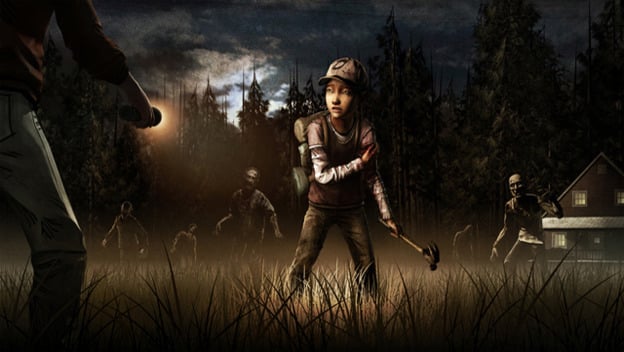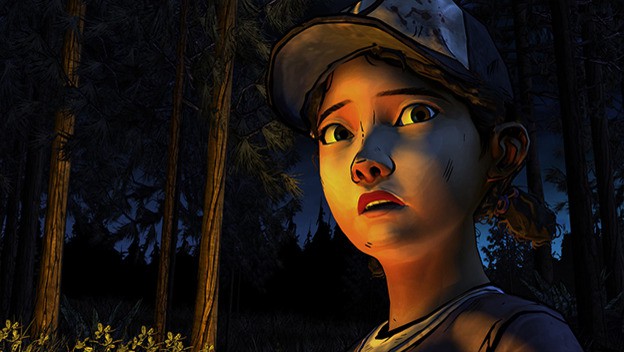A note on this article: we’re going to have tons of spoilers, so if you haven’t played the first game and don’t want it spoiled, go play it and come back. We’ll wait.
Yesterday, Telltale Games revealed The Walking Dead: Season 2 was in works by releasing a trailer featuring Clementine, the costar of the first game. The trailer was released on the ubiquitous streaming site, YouTube, with the the following description attached:
“The Walking Dead: Season Two continues the story of Clementine, a young girl orphaned by the undead apocalypse. Left to fend for herself, she has been forced to learn how to survive in a world gone mad. Many months have passed since the events seen in Season One of The Walking Dead, and Clementine is searching for safety. But what can an ordinary child do to stay alive when the living can be just as bad — and sometimes worse — than the dead? As Clementine, you will be tested by situations and dilemmas that will test your morals and your instinct for survival. Your decisions and actions will change the story around you, in this sequel to 2012’s Game of the Year.”
This description incited a reaction. It would seem that not everyone sees that Clementine is the best choice for the lead role in the sequel. From where I sit, though, she’s not just the best choice for lead role, she’s the only one.
Clementine is a 9 year-old girl during the events of the first game. Presumably orphaned, she is discovered by Lee, a hardened ex-con looking for a second chance. Fitting with her nature, she opens up to him and gives him a chance. Throughout the course of the game, she reveals herself to be insightful, wise beyond her years, intuitive, and is able to offer a perspective that adults can’t. Her innocence also takes center stage in the game’s narrative, as the player worries about the preservation of it. She is also the only character to be by Lee’s side throughout the gameplay, observing and reacting to his decisions. This is important, because the sequel will carry over progress from the first game.
Most of the other interesting characters who would be familiar to the player in the sequel have the possibility of perishing or abandoning the party. And once a character leaves, they become insignificant and unaffected by player decision. Even fan favorites, such as Kenny, are perhaps only interesting in the capacity of a supporting role. His often unpredictable behavior adds a sense of tension that would be lost to player choice. Simply put, you don’t want to be in Kenny’s head.
But beyond being just the best option available, casting Clementine as the lead opens up a variety of interesting and important narrative options. For one, her presence allows Lee’s character a choice of salvation. As such, she becomes a sort of symbol to the player and a focus of the protagonist. Much of the game’s story revolves around not only the aforementioned protection of her innocence, but also the security of her future. This is especially important, as overseeing a child could be seen as a burden, so consciously electing to protect her (or not) gives a glimpse into auxiliary characters’ humanity (or inhumanity).
The significance of Clementine and her future is no more apparent than in Episode 5’s final moments.

In it, Clementine and a (possibly) one-armed Lee have found themselves separated from the group. Lee is bitten and trying to push through for Clem’s sake, but eventually collapses and loses consciousness. After a loading screen, which I recall being rife with anxiety, Lee comes to. “Lee…wake up…” begs Clementine. ”Please don’t be dead. Please, no,” she continues, asserting her need for Lee, and presumably, her affection.
The player then finds out that during the loading screen, Clementine locked herself and Lee away from the walkers.
“Get that door open,” urges Lee, certain of his reanimation.
Some more events play out as well as the implication that Clem should shoot Lee, out of mercy and for her safety–an important skill to possess in their decaying world.
One of the player’s chosen responses reads: “You’re strong Clem, you can do anything.”
“But, I’m little..” she retorts.
“Doesn’t mean a thing,” says Lee. “You’re going to see bad stuff. It’s okay.”
And then, the player is asked to make their biggest decision yet: ask Clem to shoot you, imbuing within her an important wisdom in mercy, or request her to leave, opting to preserve her innocence a bit longer. Regardless of the player’s decision, Clementine’s future is at the heart of it.
So, how could we not want to play as Clementine in the next game? To put her as the focus? She’s the sidekick throughout the first game; it only makes sense to promote her. Is, perhaps, the reason that we’re not all psyched about the decision is that we will be in a position of disempowerment as a little girl in the sequel? That we may have to struggle to get credence or clout? That we won’t be able to bash in heads? If so, there are plenty of other video games about empowerment that you can choose from. Be my guest, I won’t judge you. You’re entitled to that.
Personally, I’m looking forward to this little bit of something different. After spending the first game teaching Clementine, I want to see how she’s grown. I want to see more of her perspective. I want to continue this story that resolved itself yet left players wondering “now what?” I want to continue along with a familiar character, feeling assured that storytelling is at the heart of this sequel and not the notion that one should cash in on successful franchises whenever possible. That’s the experience I want.
